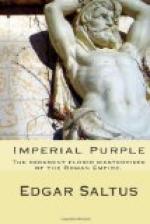It would have been interesting to have made one of that court of poets and savants that surrounded him; to have dined with him in Paris, eaten oysters in London; sat with him while he watched that wall go up before the Scots, and then to have passed down again through a world still young—a world beautiful, ornate, unutilitarian; a world to which trams, advertisements and telegraph poles had not yet come; a world that still had illusions, myths and mysteries; one in which religion and poetry went hand in hand—a world without newspapers, hypocrisy and cant.
Hadrian, doubtless, enjoyed it. He was young enough to have enthusiasms and to show them; he was one of the best read men of the day; he was poet, painter, sculptor, musician, erudite and emperor in one. Of course he enjoyed it. The world, over which he travelled, was his, not by virtue of the purple alone, but because of his knowledge of it. The prince is not necessarily cosmopolitan; the historian and antiquarian are. Hadrian was an early Quinet, an earlier Champollion; always the thinker, sometimes the cook. And to those in his suite it must have been a sight very unique to see a Caesar who had published his volume of erotic verse, just as any other young man might do; who had hunted lions, not in the arena, but in Africa, make researches on the plain where Troy had been, and a supreme of sow’s breast, peacock, pheasant, ham and boar, which he called Pentapharmarch, and which he offered as he had his Catacriani—the erotic verse—as something original and nice.
Insatiably inquisitive, verifying a history that he was preparing in the lands which gave that history birth, he passed through Egypt and Asia, questioning sphinxes, the cerements of kings, the arcana of the temples; deciphering the sacred books, arguing with magi, interrogating the stars. For the thinker, after the fashion of the hour, was astrologer too, and one of the few anecdotes current concerning him is in regard to a habit he had of drawing up on the 31st of December the events of the coming year. After consulting the stars on that 31st of December which occurred in the twenty-second year of his reign, he prepared a calendar which extended only to the 10th of July. On that day he died.
The calendar does not seem to have been otherwise serviceable. It was in Bithynia he found a shepherd whose appearance which, in its perfection, was quite earthly, suggested neither heaven nor hell, but some planet where the atmosphere differs from ours; where it is pink, perhaps, or faintly ochre; where birth and death have forms higher than here.




